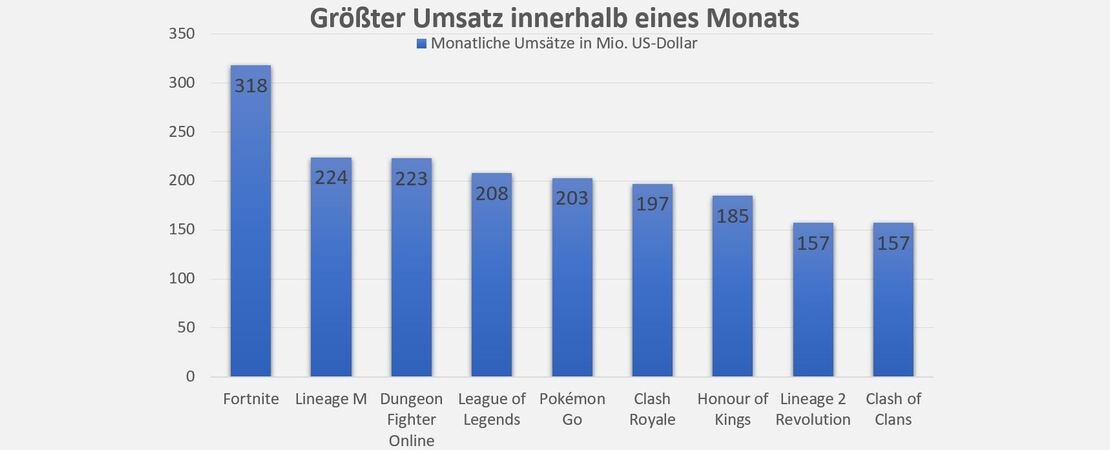The question has been asked a lot in recent years and there are different views on it. This article is intended to look at various aspects that affect the free-to-play model. From the player's point of view, free-to-play titles are always mixed feelings, on the one hand you can play the games for free, on the other hand you can often spend a lot of money here in the long run, as for a purchase title. However, the market has been booming for years and thus many publishers have discovered this type of game including the corresponding monetization for themselves.
There are strong indications of a long-term boom in this area: For example, it is said that already today more than 80% of all free-to-play games on Steam are provided with a pay-to-win model. Another indicator can be given that the developers have been increasingly concerned with monetizing in-game currencies and loot boxes in recent years.
Fortnite and League of Legends as examples
Games like Fortnite and League of Legends are bringing new ways of monetizing games to the PC. The future of PC gaming is a hot topic that is being discussed by players and developers alike. Usually, players see the topic more negatively, while developers and publishers try to defend the system.
Fortnite, a Battle Royale shooter with around 300 million downloads since its release in August 2017, has become one of the most played video games ever and is now a huge hype thanks to the optional content that can be purchased in the game's shop: Within one year of the game's release, the developer had already generated $1 billion in microtransactions in the Itemshop! So players have spent $1,000,000,000 on the game, even though you can play it completely free.
Steam, Epic Games Store and Co. enable the trend
Steam, the largest online distribution channel for PC games, recently celebrated its 20th anniversary. The platform was launched in 2003 and has more than 100 million active users. On Steam, more than 15,000 games are available for purchase - including AAA titles like Star Wars: Battlefront 2 or The Witcher 3: Wild Hunt, but also classic indie games like Super Meat Boy.
Steam has a gamer community of over 130 million users, and thus over 130 million potential players for Free2Play titles. When browsing, the players can therefore stumble across a Free2Play title by chance and download it immediately. So even small developers can reach players from all over the world without a large advertising budget. At the same time, the barrier to testing a game is simply to download it. Only the hard drive space and the speed of your own internet connection.
Other platforms such as Epic Games also enable this concept for players and developers.
The Free2Play Problem
The problem with Free2Play games is that they often have a pay-to-win model that aims to get the players to spend money on ever more and newer in-game items.
Pay2Win (also known as "pay-to-win") is a monetization strategy in which players can purchase items or services in the game that give them an advantage over other players. This can take the form of better equipment or faster access to content. An example: If a player does not want to play through the 50 levels for weapon unlocks, he can simply unlock these levels for the premium in-game currency.
However, this can only be purchased for real money. Or one simply wants to be one of the first to have a cool new design for the character or a weapon after an update. Although you can also get to the desired design by playing for hours, but then everyone has it. So you buy it for real money.

What are Ingame Currencies Anyway?
Ingame - Currencies are not real currencies, but virtual currencies that are earned in the game and can be used to purchase items or services. The developers of these games make their money through in-game currencies, which can be exchanged for real money. Most games also allow the player to earn new items over time and with a lot of effort in the respective game modes. But sometimes there are also in-game currencies that can only be obtained for real money.
The Problem With Loot Boxes
Loot boxes are a popular way to make money with in-game currencies. They usually contain a selection of certain, virtual items for the game and can only be opened after purchase. You receive one or more of the items from the loot box at random. The best item is only won with an extremely low probability, which is often between 0.01 and 0.1%. This makes a win particularly tempting and is pure gambling.
Developers will have to make some considerations for loot boxes. Because if a publisher or developer wants to make money from loot boxes, they will also have to contain desirable items. There are usually two types of loot boxes in games.
Loot boxes can be divided into different categories:
-
Prize box: These contain items or skins
-
Progress aid: Supports the player in his progress in the game
In order to always buy new loot boxes from the existing players, new content is always being created. Time-limited offers increase the pressure on the players and so there are true collectors in the gaming community.
The Future of Free2Play Games
The market has been booming for years and as a result, many publishers have discovered this form of monetization for themselves. There are now hardly any AAA titles left that do not rely on loot boxes or similar. The cost pressure in the video game world is enormous, as the graphics are getting higher and higher, making development more expensive. The complexity of the game itself, which the players demand, also requires more and more resources and employees at the developers.
But since the players show in Fortnite and other Free2Play titles how willing they are to spend real money on content, the trend is far from over. We rather expect the proportion of games to increase significantly. Above all, developers can also generate constant revenue for months and years after development. With classic purchase titles this is usually not possible.
What do you think about Free2Play titles? Are they a curse or a blessing?
